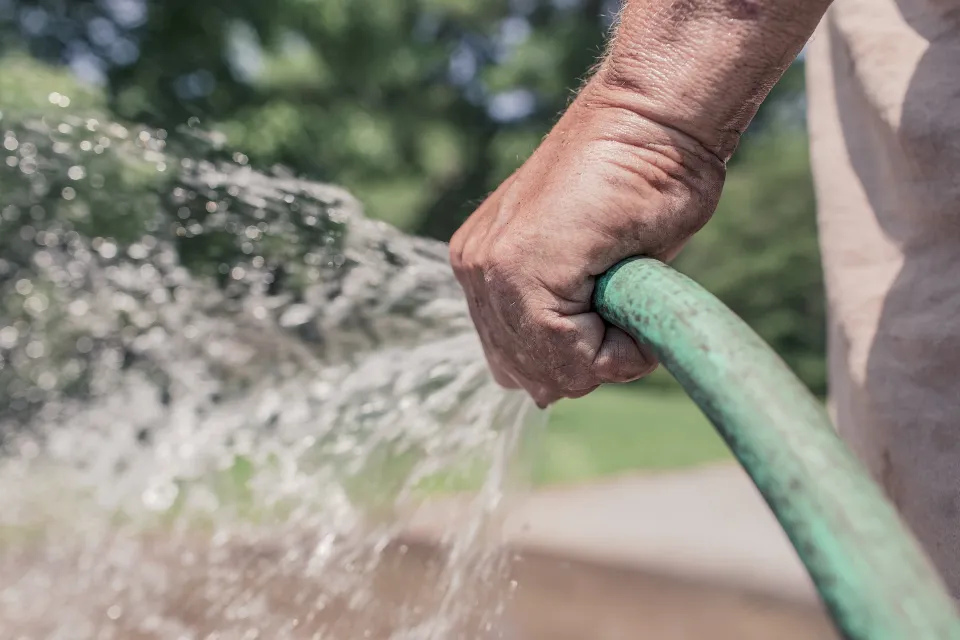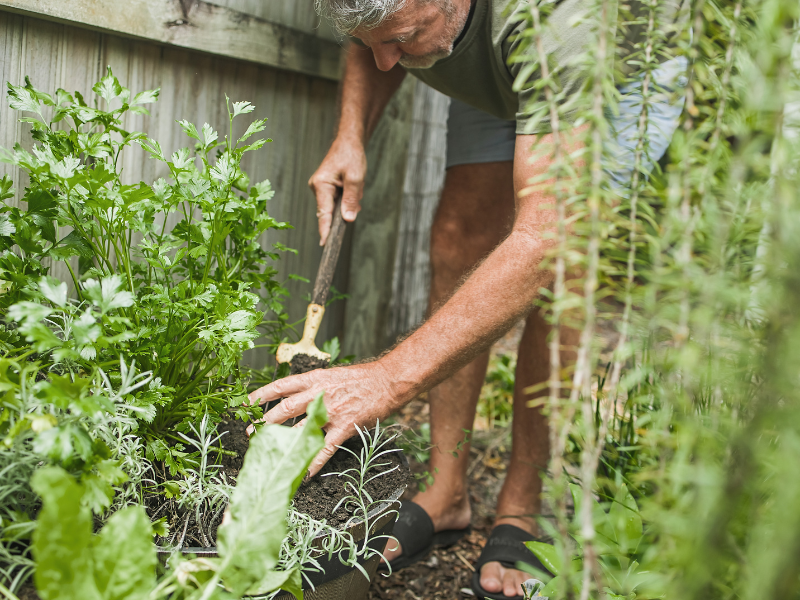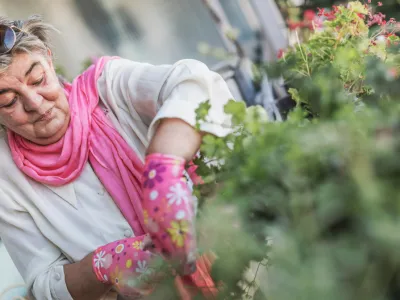Age gracefully!
Written By Peter Piper
Active on your allotment? – it is one of the best ways to age gracefully!
Why do I have an allotment? Is it because I love the fresh produce and the company of like-minded people? Well of course that is true ….. but also it gives me the physical exercise that is now known to be the best way of slowing the ageing process.
We are bombarded with a lot of stuff about ageing, but most of it has absolutely no firm scientific basis (and is therefore potentially “fake news”). Mass marketing is always promoting the message that it is fundamentally about the condition of your skin. Indeed by just looking at someone you can hazard a good guess as to their age. However nobody has ever died from aged skin, so let us stick instead to the sound science.

So what is ageing?
Scientifically it is viewed not as a disease state, but rather as progressive decline in multiple functions over time. Just how well we age is influenced very strongly by lifestyle factors such as diet, sleep and physical activity. The rate at which it occurs is also probably, at least in part, programmed by our genes. There are a few, fortunately very rare, genetic diseases where the afflicted individuals age prematurely.
In normal ageing a number of processes can be paramount (see (1) below); most notably a declining muscle mass and strength that leads to slower walking speed and altered gait in the elderly (sarcopenia)(2), a raised blood pressure (hypertension) and hardening of the arteries (atherosclerosis), chronic increases in inflammation, a reduced ability to mount an immune response to infections (immunosenescence), a loss of our ability to regenerate tissues (stem cell exhaustion) and cognitive decline. If you are fortunate enough not to die from disease, one or more of these factors will generally incapacitate you in a very old age, but it is unlikely that you will succumb to all of them. There is evidence that declining muscle mass and strength has often started already by age 45, its progression being inversely associated with body mass index (BMI). Indeed having a slow walking speed in middle age may be a sign of premature ageing (4).
So much for the bad news! Because declining muscle mass and strength is a major factor in so many of the adverse health outcomes and societal costs of old age, such as frailty, hospitalization and mortality, many scientific studies have focussed on whether it can be counteracted through exercise training, nutritional supplementation, or hormonal therapies. To date only physical activity, taken together with a diet sufficiently high in protein (5,6), has been proven to have any positive effect in slowing symptoms of ageing. Irrefutable scientific evidence now shows that sustained physical activity is very important for a healthy old age; that exercise counteracts not just declining muscle mass and function, but also many of the other adverse features of ageing. In contrast a sedentary lifestyle exacerbates poor health in the elderly.
In a recent detailed study scientists carried out tests on 125 cyclists aged 55 to 79 and compared them with healthy adults from a wide age group who did not exercise regularly (75 people aged 57 to 80 and 55 young adults aged 20 to 36)(3). In contrast to the non-exercising control group, the cyclists were found to have retained their muscle mass and strength with age, while maintaining stable levels of body fat and cholesterol. Amateur, non-competitive cyclists were chosen for this study since their activity – like strenuous allotmenting!- does not involve excess joint loading, requires a high degree of motor control, produces high muscle forces and imposes significant challenges to the cardiovascular and respiratory systems. Furthermore, in this study of the amateur cyclists the anti-ageing effects were found – quite surprisingly – to extend to the immune system (3). Normally an organ called the thymus, which makes immune cells called T-cells, starts to shrink from the age of 20. Remarkably, the thymuses of the older cyclists were generating as many T-cells as those of young people. If you live to be over 100 your fate may be eventually sealed because your immune system has largely packed it in and you have only a limited capacity to fight infections.

Not only is physical activity beneficial for preserving muscle mass and strength, it is also believed to improve thinking and memory in middle-aged or older adults; as well as decrease the risks of dementia (7) and cancer (1). We are all only too well aware of how a spell on our allotment improves our mental well-being! One cannot yet make a firm statement that physical exercise is panacea for each and every manifestation of ageing. However, scientists are increasingly coming to view our muscles as the main source of the biological signalling molecules (“cytokines”) that act either to accelerate, or slow, the ageing process.
There is one other factor you might like to consider – your diet. It has long been appreciated that physically active people need to consume more protein than those who live a sedentary lifestyle. Conversely, insufficient protein intake is one of the main contributors of declining muscle mass and strength in the many people who struggle to eat in care homes. Research now indicates that bumping up the protein in your diet can help stop your muscles declining as you age. However it seems that it is not enough just to eat more protein. In order to maximise its benefits for muscle mass older people also need to spread this increased protein intake evenly across all of their meals (8,9). A number of foods are protein-rich; lean meat, fish, tofu, beans, eggs, Greek yogurt, cottage cheese and lentils to mention a few.
Just how much protein should you consume to help stop your muscle mass declining as you age? According to a recent study (10), if you’re an older man, bumping up your protein intake by just an extra 0.5 gram per kg of body weight could have a considerable effect. And if you’re a woman, aim even higher. Studies (cited in (10)) suggest that older women require more protein to maintain muscle mass than older men, possibly as much as 30% above normal recommended diets. It has been suggested that for older people the amount should be at least 1.2g/kg a day and perhaps for very active older individual even higher- 1.6-2.0g/kg. Glancing at persons on our site, I would state that most of us are in the 60-80kg (10-12 stone) range, so eating 1.6g/kg equates to 96-120g of protein per day.
As you age your digestive system undergoes major changes, your gut generally becoming less efficient at adsorbing your nutrition. Essential for your digestion and general health are the multitude of different types of bacteria (the “microbiome”) within the small intestine. This microbiome changes as you age, these changes increasingly tending to produce harmful inflammation that damages veins and blood vessels (11)…. You can view this as the “bad” bacteria coming to predominate over the “good” bacteria. The range and types of these gut bacteria is depleted with a poor diet, thereby helping to speed up the onset of frailty. This is often a problem for older people in long term residential care. Conversely, diets high in fiber and probiotic-rich cultured food (e.g. live yogurt) promote a healthy gut microbiome which, in turn, helps to slow deteriorating bodily functions and the onset of frailty. Maintaining a healthy microbiome also appears to be linked to improved brain function (11). In addition, by decreasing inflammation, it improves cardiovascular function and therefore helps to prevent heart disease (11). One study of older people found that eating a Mediterranean diet for a year boosted their “good” gut bacteria – the bacteria linked to ‘healthy’ ageing – while reducing the “bad” types associated with harmful inflammation (12). This is basically a diet rich in fruits, vegetables, nuts, legumes, olive oil and fish but low in red meat and saturated fats. It is quite possible that some of the other things attributed with “anti-ageing” properties in the health food shops (pomegranate, garlic, etc.), if they work at all, operate through this process of increasing the gut bacteria linked to ‘healthy’ ageing. However with all our lovely allotment produce we have no need for all those expensive pills in Holland and Barrett!
Further reading:
(1) https://www.health.harvard.edu/staying-healthy/exercise-and-aging-can-you-walk-away-from-father-time
(2) https://www.sciencedaily.com/releases/2018/01/180117225458.htm
(3) https://www.sciencedaily.com/releases/2018/03/180308143123.htm
(4) https://www.medicalnewstoday.com/articles/326648.php#1
(5) https://www.sciencedaily.com/releases/2017/08/170830202131.htm
(6) https://www.sciencedaily.com/releases/2020/03/200316104012.htm
(7) https://www.alzheimers.org.uk/about-dementia/risk-factors-and-prevention/physical-exercise
(8) https://www.sciencedaily.com/releases/2020/03/200316104012.htm
(9) https://www.sciencedaily.com/releases/2017/08/170830202131.htm
(10) https://doi.org/10.3390/nu12061700
(11) https://www.sciencedaily.com/releases/2019/03/190319163527.htm
(12) https://www.sciencedaily.com/releases/2020/02/200217192025.htm
